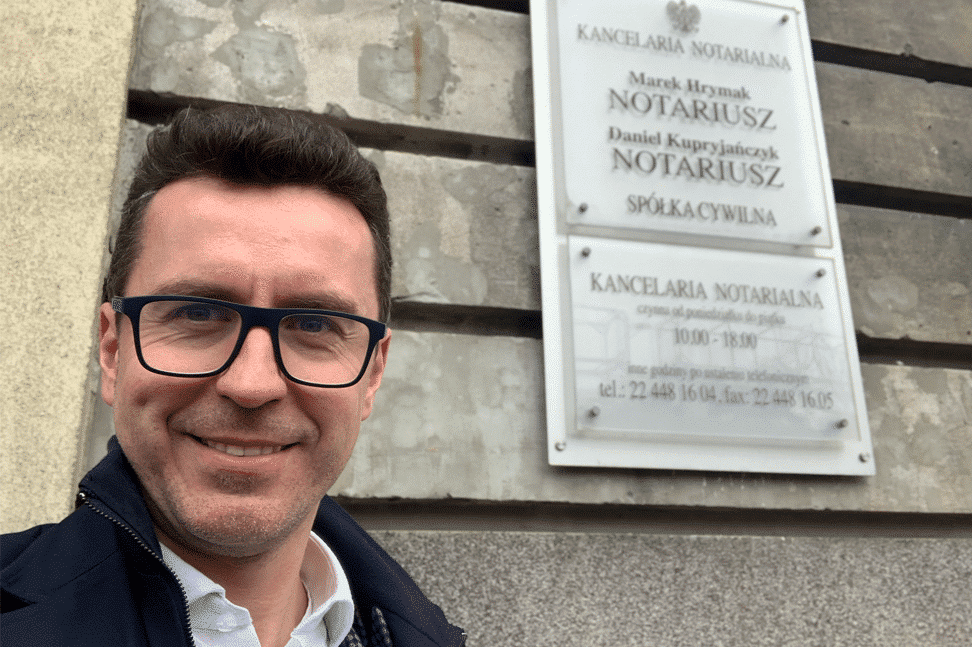Oral translations – Interpreting rate per hour? That is, how long can a given transaction requiring the presence of a sworn English interpreter last? And how much does the presence of a sworn interpreter at a notarial office in Warsaw city centre cost?
- Interpreter cost per hour (first) – PLN 400 net
- Price for two hours of oral translation – PLN 600 net
- Price for four hours of sworn interpreter’s services – PLN 1.100 net
Rate per Hour of Interpreting / Oral Translations
Interpreter price – one hour of oral translation – PLN 400 net (Warsaw)
A certified translation (commonly called a “sworn” translation) is usually associated with a written translation on which the translator affixes his seal and signature. Of course, this is a good association, but a sworn translator translatesnot only written documents. He or she also interprets. This is clearly indicated in clause 3 of Article 13 of the Act on the Profession of Sworn Translator of 25 November 2004..
In addition, the same law specifies that a candidate for a sworn translator must prove that, in addition to his/her ability to translate, he/she has highly developed interpreting skills (oral translations skills). These skills are tested during the second stage of the sworn translator examination.
Jaka jest cena: tłumaczenie ustne cena za godzinę tłumaczenia?
The rate per hour of interpreting in the centre of Warsaw is PLN 400 net. Please remember this is the rate for one hour, not an hourly rate. If you book more time, the rate per hour will be lower. Please remember that a sworn translator is able to fully interpret up to 10 pages of a notary’s deed in one hour.

Rate for 2 Hours of Interpreting (Oral Translations)
Two hours of oral translation – PLN 600 net (Warsaw)
In the next part of this article, I will talk more about the details of the working time of an interpreter and the pay for performing a “sworn” interpretation. I will answer the following questions:
- During which transactions is interpretation by a sworn translator required?
- What is the approximate duration of each notarial transaction?
- Why does the interpreter price depend on the time of a given transaction, i.e. the translator’s availability, not on the time of actual interpreting?
- What is the price of a court interpreter’s availability for transactions of up to one hour or longer?
When to Engage Sworn Translator’s Services?
During which transactions is interpretation by a sworn translator required?
In short, a certified interpretation (oral translations) is required whenever a foreigner who does not speak Polish is involved in any official transactions. It may be a court hearing, a police interrogation, but also a civil wedding, the purchase of a real property, granting a power of attorney, or, for example, a dispute in a court of arbitration.
I will not describe the first two examples, because in these cases the authorities that make the appointments, i.e., the court, the prosecutor’s office, or the Police, are responsible for appointing a sworn interpreter. Such appointments are the only ones subject to the Regulation of the Minister of Justice (…) on remuneration for the services of a sworn translator.
This means that the rate for 1 hour of interpreting (notarial translation) is set from aboveand that we have no influence on the selection of a particular sworn interpreter. We are also unable to estimate the price for the whole interpreting service because we do not know how much time the service will take.
Official Acts
Official acts: court hearing, police questioning – the interpreter is appointed by officials, not you
Other examples are of much greater interest to my Clients, because in such cases they have to arrange and pay for the interpreter themselves. Clients usually need to book an interpreter’s time to visit a notary or the Registry Office, simply because a foreigner who is not fluent in our native tongue has to take part in a particular act in law.
Therefore, I will outline an overview of the acts in law during which certified interpreting is required and the approximate duration of those acts. But first, let’s remind ourselves why the duration of interpretation is so important.
Engage an interpreter if you are planning: a civil wedding, purchasing real estate, granting a power of attorney, any visit to a notary, a visit to the Registry Office
Block vs. Certified Interpreting – Oral Translations
What is the approximate duration of each notarial transaction?
The estimated duration of a certified interpretation is very important for both clients and interpreters. This is due to the fact that the billing unit for an interpretation is an interpretation block.
Sworn interpreters often bill clients in one-hour blocks (i.e., 1 hour is 1 block) – although there are exceptions to this general rule. However, this is the shortest possible period for which you can book an interpreter’s time, even if the transaction lasts 20 minutes. It’s worth remembering, though, that if your planned interpreting time is longer than one hour, it’s worth making an appointment for a two-hour block right away. Why?
It is clear that if the interpreting exceeds one hour, the interpreter will charge us for another full block. It may be more cost-effective to make an appointment for a two-hour block right away rather than for an hour because if the interpretation is prolonged you will have to pay extra for the additional time.
A transaction lasting only 20 minutes = 1 hour of an interpreter’s work, i.e., PLN 400
Oral Translations – Interpreting – Extending the Interpreter’s Working Time
Another important reason for careful planning and reserving the interpreter’s time is the fact that interpreters have very busy schedules. On more than one occasion, when I finished a one-hour-long interpreting job in ul. Marszałkowska, I had less than 30 minutes to be just in time for the next scheduled transaction at a notarial office 20 minutes away.
An extension of the interpreter’s working time is not always possible and in unfavourable conditions both the notary and the interpreter have to be re-arranged to complete the notarial transactions.
Book the interpreter’s time with a slight safety margin so he doesn’t leave in the middle of the interpreting
Estimated Time of Oral Translations
Estimating the interpreting (oral translations) timeis not difficult as long as you call the notarial office on the eve of the interpreting at the latest and make sure how many physical pages the deed drafted by the notary has.
It is enough to know how much time we would need to read aloud with understanding a deed having 1 physical page, 10 pages, or 17 physical pages. The time required for the interpreter will be identical, assuming that:
- The interpreter receives a specimen of the deed by e-mail the day before the interpretation;
- the interpreter is a professional and has the ability to simultaneously follow the text in Polish with his/her eyes while pronouncing it aloud in English (the so-called a-vista interpreting),
Read the deed aloud – that’s how long the translation itself will take
Further estimation of the interpreter’s time should include possible time for asking questions if the foreign client has any. It should be remembered that theinterpreter certifies his/her presencewith his/her signature on the notarial deed, therefore any other unforeseen circumstances that postpone the moment of signing the deed should be included in the interpreter’s working time.
Do not forget to add time for questions – the interpreter must stay until the end and sign the deed
We already know how to estimate the time of an interpreter’s work and why it is so important. Now we should find out exactly what transactions require the presence of a sworn interpreter and what is the estimated duration of each of them.
If you have no questions about the content of the deed and it is up to 7 physical pages – book an interpreter for 1 hour – rate PLN 400
Oral Translations at a Notary’s – How Many Hours for Notarial Translation?
Apart from civil weddings, most of the acts in law during which a sworn interpreter is booked directly by the Client take place at a notarial office. As we already know, if a foreigner is to take part in such an event, the presence of a sworn interpreter is essential.
We should remember that a sworn English interpreter may be present during the reading of a notarial deed for a German, Spanish, Portuguese, Chinese national and citizens of other countries provided that this person is fluent in English. This is the economical version of choosing an interpreter, as the rate per hour of a sworn English interpreter is lower than that charged by an interpreter of any other language.
The task of a sworn interpreter is to translate for a foreigner, into a language he or she understands, the content of the deed, which the notary reads out to those present, and then to affix his or her signature to certify the translation. What can these acts in law be? (called notarial translationby some of my Clients).
Establishment of Companies, Signing Srticles of Association
I very often receive requests for interpreting at a notarial office (notarial translation) during the granting of a power of attorney. This usually takes less than an hour – in this case a block of an hour is sufficient.
The same applies to various transactions that concern companies– setting up a company, signing the articles of association or amending them, etc. Such transactions also last about an hour and booking a two-hour block is unnecessary. Below I present a list of the most frequently translated notarial deeds.
Overview of the Most Frequently Translated Notarial Deeds
I would like to remind you that in any case the course of an act in law depends on the official or notary as well as on the person performing the transaction. If a lot of questions arise during the signing of the notarial deed, the duration of such act in law increases.
The same happens, when, for example, the notarial deed is longer than usual. The times shown below are indicative only and should not be interpreted as a commitment on the part of either interpreter.
Transactions That Usually Last Up to 1h:
- granting a power of attorney (translation of a power of attorney),
- signing the articles of association (translation of articles into English)
- signing a share transfer agreement,
- making a statement on submission to enforcement,
- making a will,
- signing a pre-nuptial contract,
Transactions That Usually Last More Than 1 h:
- signing a developer contract,
- signing a real property sales contract.
Certified Oral Translations at the Registry Office
A sworn interpreter goes to the Registry Office as often as to a notarial office to interpret (notarial translation). For what purpose? Oral translations at the Registry Office often involve interpreting a civil marriage to a foreigner. Such an act in law requires two meetings during which a sworn English interpreter must be present.
The first meeting is a bit longer. It concerns submitting documents and assurances necessary to contract a marriage. During this meeting, the future spouses sign a protocol of acceptanceof the assurances and declarations on the surnames they and their children will use after the wedding.
Of course, in order to sign such a document and for it to be valid, the foreigner must fully understand its content – hence the need for a sworn interpreter to translate it and confirm the translation with his/her signature. This meeting, although previously described as slightly longer, usually lasts about 40 minutes, so a one-hour block is sufficient.
The second meeting is the wedding ceremony itself. It would seem that here the block should be shorter – after all, a civil wedding itself usually takes 15-20 minutes. Nothing could be further from the truth – first, the smallest block that a sworn interpreter usually bills for is one hour. Second, the interpreter has to arrive about a quarter of an hour before the ceremony to complete all the necessary formalities with the Head of the Registry Office and translate them for the foreigner.
Interpreting at a Wedding at the Registry Office
Although marriage is by far the most common task of a sworn interpreter at the Registry Office, there are other acts in law during which one is required. An example of these is acknowledgment of paternity.
Both acknowledgment of a child born and unborn – by a foreigner. In this case the sworn interpreter translates the questions and information from the Head of the Registry Office. The purpose of the interview is to verify whether the foreigner is indeed the biological father of the child and to instruct on the rights and obligations arising from paternity.
The Head of the RO then explains the rights and obligations that will arise from the acknowledgment of paternity. Then the interpreter, along with the Head and the child’s parents, signs the protocol. This act in law is also usually completed in about 30-40 minutes, so a one-hour block is sufficient here.
Overview of the Most Frequently Translated Official Acts
As I mentioned earlier, the duration of an act in law often depends on its efficient organisation by the official. Similarly, providing additional explanations has an impact on extending the act. In each case the time calculated by the interpreter is the time of his/her availability, even if the commencement of the act in law is delayed for reasons beyond the control of the Client.
Transactions That Usually Last Up to 1h:
- filing documents for a wedding in the Registry Office,
- a wedding at the Registry Office,
- acknowledgement of paternity,
- child registration,
- an interview at the Office for Foreigners.
Transactions That Usually Last More Than 1 h:
- hearing before a court of arbitration – interpretation in court
- a hearing before the National Appeals Chamber.
To sum up the issue of certified interpreting, it is worth remembering a few important things.
- Po pierwsze, takie tłumaczenie potrzebne jest w sądach powszechnych lub prokuraturze. Wtedy organizują je te właśnie organy. Niezbędne jest również podczas czynności notarialnych, albo wykonywanych w urzędach.
- In such case, it is up to the foreigner or a person acting on his/her behalf to ensure the presence of a sworn interpreter.
- Second, in order to book an interpreting service, it is good to know how long each act in law lasts. This is because interpreters bill Clients in blocks, often of one hour.
- For the majority of acts this is sufficient – granting a power of attorney, establishing a company, or submitting documents for a civil wedding will usually not take longer. However, there will be situations where a two-hour block will be indispensable, e.g., in the event of purchasing real estate.
- Warto również pamiętać, że godzina to absolutne minimum. Jeśli prognozujemy, że nasza czynność potrwa kwadrans, z tłumaczem musimy się umówić na godzinę. W każdym przypadku czas tłumaczenia nie zależy wyłącznie od tłumacza.
- The greatest influence is exerted by the efficient organisation of time on the part of the notary or official. The issue of additional questions asked by the participants in the act is also important.
Express Translations
Of course, all the rate offers presented here apply if a sworn translator’s time is booked a few days in advance. Express translationsare governed by their own rules – both in the case of interpreting and translation.
If you order an express translation, you should expect the rate to go up by 50% or even 100%. Everything depends on how many translations I have ordered for a given day. I invite you to my office MIW Marszałkowska – sworn translator Warsaw city centre– Maciej Wróblewski.
Cheers!
Maciej Wróblewski – sworn translator of English – MIW Marszałkowska

